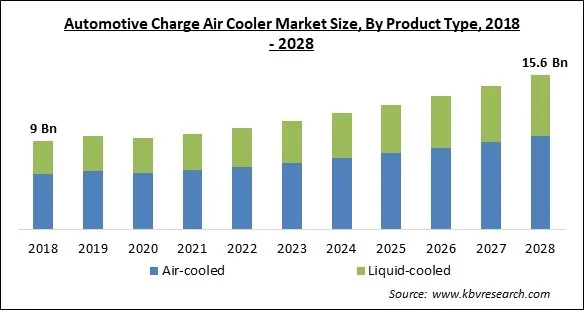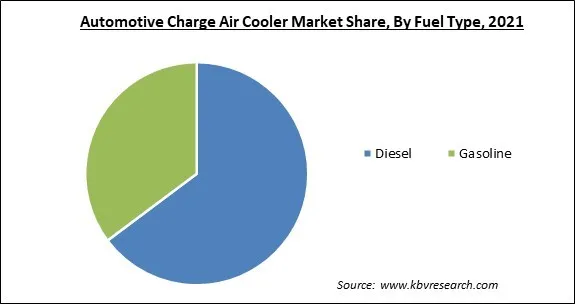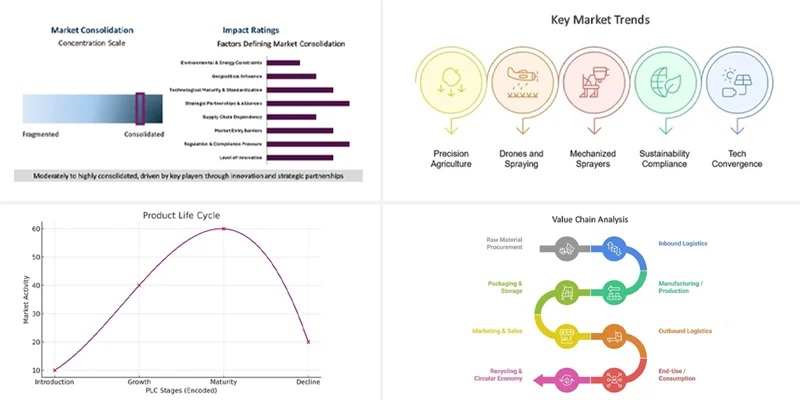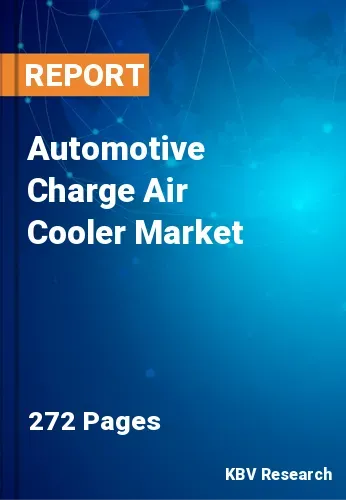The Global Automotive Charge Air Cooler Market size is expected to reach $15.6 billion by 2028, rising at a market growth of 7.2% CAGR during the forecast period.
Prior to entering the engine's intake manifold or combustion chambers, compressed air is cooled using a charge air cooler. The turbocharger's compressed air has a high temperature, which lowers its density and causes less oxygen to be present during combustion. Manufacturers are attempting to lower fuel consumption and boost vehicle efficiency by downsizing engines, a trend that is still going strong in the automobile industry.

Increasing the engine's combustion efficiency is the primary goal of the vehicle charge air cooler. In turn, this makes the automobile charge air cooler a desirable item on the market. The need for lower fuel usage is expanding rapidly as a result of changes in governmental legislation and increasing performance standards.
Consequently, it is predicted that the automotive charge air cooler market will experience significant expansion throughout the course of the forecast period. The purpose of a charge air cooler is to cool combustion air, bringing the temperature down to a range that is best for power production and fuel usage. Having air that is denser and cooler helps the engine's combustion process run at its most efficient level. Additionally, it lowers the necessary fuel usage.
Both commercial and passenger cars use it. The drivers driving the industry's expansion include consumer demand for vehicles with lower fuel consumption, more powerful engines, and lower pollutants, as well as rising vehicle turbocharger usage and rising demand for both passenger and commercial vehicles.
Vehicle production has decreased as a result of COVID-19, and this decrease is inversely correlated with the drop in the market for automotive charge air coolers as a whole. In contrast, it is anticipated that the pandemic effect will aid the gasoline segment in growing over diesel because diesel engines are expensive, and the introduction of new emission rules further drives up their price, particularly in light-duty cars. Additionally, COVID-19's effects would reduce purchasers' purchasing power, which might lead to the purchase of gasoline-powered automobiles rather than diesel-powered ones. As a result, a movement in favor of GDI or gasoline engines may be seen. As a result, the market for automobile charge air coolers will have a higher chance of expanding.
Vehicle emissions can be reduced with the aid of turbochargers. Utilizing a turbocharger lowers the cylinder's displacement volume, which lowers the volume of fuel required for the same output and lowers the vehicle's exhaust emissions. Additionally, it improves fuel economy. These factors have led to a greater push for the usage of turbocharger technology, particularly in passenger cars. These and other factors are fueling the market for automotive charge air coolers.
Engine development has been driven by ongoing research into ways to use less fuel and emit fewer emissions. In particular, the tendency to shrink engines while maintaining high performance has resulted in a steadily rising specific component load. The need for thermal control has changed as compact, turbocharged engines have taken the place of high-volume engines. Thus, charge air coolers are becoming more and more necessary for the development of high-performance engines, which has increased demand for them.
Governments around the world are promoting the adoption of alternative fuel automobiles as environmental worries regarding conventional cars remain on the rise. Electric vehicles, also known as EVs, are zero-emission cars that are becoming more and more popular around the world for public transportation. To promote the usage of EVs, several national governments provide financial advantages, such as tax exemptions and rebates, subsidies, cost-free charging, and decreased parking/toll rates. These elements are impeding the market's expansion for automotive charge air coolers.
Based on product type, the market is classified into Air-cooled and Liquid-cooled segments. In 2021, the air-cooled charge air cooler market had the largest revenue share. The most popular type of vehicle charge air cooler on the market is an air-cooler or direct charge cooler. With this technique, ambient air from outside is used to chill the charge air. Air-cooled coolers have a number of advantages, including affordability, lightweight, enhanced reliability, and ease of use.

Based on the vehicle type, the market is classified into Passenger Vehicles, Light Commercial Vehicles, Heavy Commercial Vehicles, and Others. In 2021, the passenger vehicle segment had the major revenue share. The automobile charge air cooler is used in passenger cars to increase the combustion engine's turbocharging efficiency. Additionally, it reduces the amount of pollutants emitted and the amount of fuel used. Additionally, increased power output and reduced torque result in an improvement in the way the car accelerates.
Based on design type, the automotive charge air cooler market is classified into Fin & Tube and Bar & Plate. Over the forecast period, the bar & plate category is anticipated to post a sizable CAGR. Although the bar and plate construction is heavier than tube and fin, it is useful. The bar & plate charge air cooler's astounding variety of fin designs is one of its features. These gadgets are perfect for big off-road equipment, heavy vehicles, and high-stress, high-boost-pressure environments.
Based on fuel type, the market is categorized into diesel and gasoline segments. Over the forecast period, the gasoline segment is expected to have the high growth rate. Due to worries over emissions, many nations aim to gradually phase out diesel automobiles. This will then help gasoline-powered automobiles. Due to emission standards, more gasoline automobiles are using turbocharging. Additionally, the cost of diesel vehicles is influenced by emission standards, which will support an increase in the sales of gasoline-powered automobiles.
Based on the position type, the market is divided into Integrated and Standalone Submarkets. In 2021, the standalone position type had the largest share. Contrasting to the integrated system, it is a conventional system that is more expensive. In comparison to an integrated system, a larger number of components are needed in this system. The air cooler is charged, and the intake manifold operates according to a separate mechanism.
| Report Attribute | Details |
|---|---|
| Market size value in 2021 | USD 9.6 Billion |
| Market size forecast in 2028 | USD 15.6 Billion |
| Base Year | 2021 |
| Historical Period | 2018 to 2020 |
| Forecast Period | 2022 to 2028 |
| Revenue Growth Rate | CAGR of 7.2% from 2022 to 2028 |
| Number of Pages | 272 |
| Number of Tables | 500 |
| Report coverage | Market Trends, Revenue Estimation and Forecast, Segmentation Analysis, Regional and Country Breakdown, Companies Strategic Developments, Company Profiling |
| Segments covered | Product Type, Fuel Type, Vehicle Type, Design Type, Position Type, Region |
| Country scope | US, Canada, Mexico, Germany, UK, France, Russia, Spain, Italy, China, Japan, India, South Korea, Singapore, Malaysia, Brazil, Argentina, UAE, Saudi Arabia, South Africa, Nigeria |
| Growth Drivers |
|
| Restraints |
|
Based on geography, the Automotive Charge Air Cooler Market is classified into North America, Europe, Asia Pacific, and LAMEA. In 2021, Asia Pacific led the market and held the largest share. Asia Pacific is home to a few of the world's fastest-growing economies and populations, including China and India. The economies and industries of Asia are developing, which is driving up demand for goods like automobiles. Some of the largest automakers globally are found in nations like Japan and South Korea. Over the forecast period, North America is predicted to develop at the high rate.
Free Valuable Insights: Global Automotive Charge Air Cooler Market size to reach USD 15.6 Billion by 2028
The market research report covers the analysis of key stake holders of the market. Key companies profiled in the report include Dana Incorporated, Valeo SA, Mahle GmbH (Mahle Stiftung GmbH), Hanon Systems (Hahn & Co. Auto Holdings Co., Ltd.), T.RAD Co., Ltd., Modine Manufacturing Company, Banco Products (India) Ltd., AKG Group, Sterling Thermal Technology Limited (Nova Capital Gp Investments Xi Lp), and C, G, & J, Inc.
By Product Type
By Fuel Type
By Vehicle Type
By Design Type
By Position Type
By Geography


The global Automotive Charge Air Cooler Market size is expected to reach $15.6 billion by 2028.
The Growing Use Of Turbochargers In Passenger Vehicles are driving the market in coming years, however, Increasing Acceptance Of Electric Vehicles restraints the growth of the market.
Dana Incorporated, Valeo SA, Mahle GmbH (Mahle Stiftung GmbH), Hanon Systems (Hahn & Co. Auto Holdings Co., Ltd.), T.RAD Co., Ltd., Modine Manufacturing Company, Banco Products (India) Ltd., AKG Group, Sterling Thermal Technology Limited (Nova Capital Gp Investments Xi Lp), and C, G, & J, Inc.
The expected CAGR of the Automotive Charge Air Cooler Market is 7.2% from 2022 to 2028.
The Diesel segment acquired maximum revenue share in the Global Automotive Charge Air Cooler Market by Fuel Type 2021 thereby, achieving a market value of $9.6 billion by 2028.
The Asia Pacific market dominated the Global Automotive Charge Air Cooler Market by Region 2021, and would continue to be a dominant market till 2028; thereby, achieving a market value of $6.2 billion by 2028.
Our team of dedicated experts can provide you with attractive expansion opportunities for your business.

